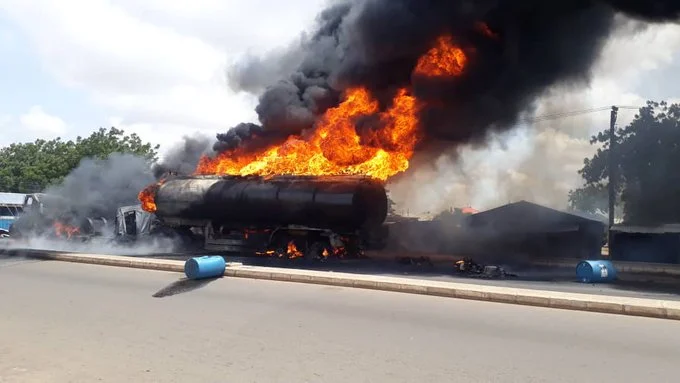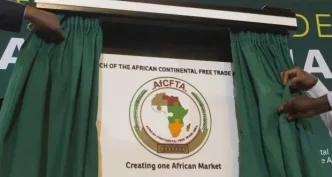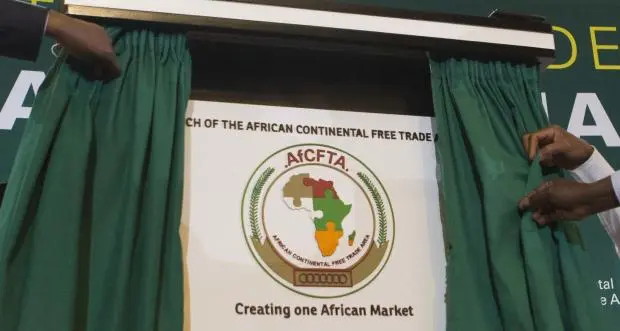BY OGUNGBILE EMMANUEL OLUDOTUN
I have always dreaded the 150km Oyo-Ogbomoso highway, not because of its long stretches or the traffic delays, but because of the constant, nerve-wracking encounters with fuel tankers. Each time I travel that road, an unsettling fear grips me whenever I see one of these monstrous vehicles swaying on the narrow, pothole-ridden lanes. I clutch the edge of my seat, hoping that the driver, who might be exhausted from hours on the road or handling a poorly maintained vehicle, does not make one wrong move.
There is no escaping the anxiety. These tankers, often overloaded leave little room for error. The sheer number of them on the highway is overwhelming. I recall one particular trip when a tanker swerved dangerously close to my vehicle while trying to overtake another. The sight of its massive, rust-covered body looming over us was terrifying. A single mistake, a slight miscalculation, could have turned the scene into another fiery disaster, one that would make headlines like the recent explosion in Enugu, where 15 lives were lost, or the tragic inferno in Suleja that killed over 98 people.
The persistent horror of these accidents across Nigeria raises urgent questions: Who will end this deadly cycle? How many more lives must be lost before something changes?
Advertisement
Nigeria’s tanker explosions often follow a predictable pattern. When a tanker overturns, spilling fuel onto the road. Within minutes, desperate individuals rush to the scene to scoop the valuable liquid, undeterred by the well-known risks. A single spark, a cigarette, a phone, or even static electricity, triggers an inferno, consuming everything in its path.
Beyond fuel scooping, another recurring pattern is reckless driving by tanker operators. Many tankers operate at high speeds on poorly maintained roads, making them prone to accidents. Additionally, many of these vehicles are poorly serviced and frequently break down, creating hazards for other road users.
The victims are not just the scoopers. Bystanders, motorists, and emergency responders also fall prey to the uncontrollable blaze. Vehicles, houses, and businesses near the scene are often destroyed, deepening the economic impact of these disasters.
Advertisement
Yet, despite the repeated carnage, many Nigerians continue to engage in this life-threatening practice, driven by poverty and fueled by ignorance or desperation. With rising fuel prices and erratic supply, free fuel from a fallen tanker is a temptation too strong for many to resist.
I wouldn’t want to overwhelm you with the grim details of recent tanker explosions, but the reality is undeniable. From Jigawa to Niger, Ondo to Plateau, and Ogun State, these tragedies have painted a pathetic picture of loss and devastation. Between April 2023 and January 2025, countless innocent, ignorant, and vulnerable lives have been claimed. These disasters are not isolated incidents; they are part of a deadly cycle that continues to repeat itself year after year.
One must ask: Why do these explosions keep happening? Nigeria’s roads are notorious for their deteriorating conditions. Potholes, narrow lanes, and weak bridges make driving hazardous, especially for heavy-duty vehicles like fuel tankers. Overloaded and poorly maintained tankers frequently lose control, overturning on highways and spilling fuel. Despite existing regulations, many fuel tankers lack basic safety features such as anti-spill valves. Additionally, poorly trained and overworked drivers—some operating without valid licenses—pose serious risks. Corrupt practices within regulatory agencies allow unfit tankers and unqualified drivers to remain on the roads.
By the time emergency responders arrive at accident scenes, fuel scooping has often already begun. The absence of proper cordoning-off measures makes it difficult to prevent large crowds from gathering, leading to mass casualties when explosions occur. With inflation at record levels and fuel prices skyrocketing, many Nigerians see free fuel as an opportunity to ease financial hardship. The lack of public awareness campaigns on the dangers of fuel scooping further exacerbates the problem.
Advertisement
Following the Suleja explosion, Nigeria’s information minister, Mohammed Idris, described the situation as “very worrying” and called for urgent measures to prevent further tragedies. Additionally, the National Orientation Agency (NOA) also launched grassroots campaigns to educate communities about the dangers of fuel scooping, stating that they would visit local governments and wards to raise awareness.
However, for me, this response is neither satisfactory nor proactive enough. The government’s actions have been largely reactive rather than preventive. Despite repeated promises, tanker explosions remain a persistent threat, and enforcement measures have not been strong enough to deter negligence within the fuel transport industry.
Moreover, the NOA’s delayed response raises serious concerns. Why does the agency only take action after tragedies occur? Channels TV and other media outlets have been more proactive in educating the public on the dangers of tanker accidents, something that should have been NOA’s primary responsibility. The agency must step up its efforts before more lives are lost.
To prevent further tragedies, urgent measures must be implemented. The government must ensure that all fuel tankers are equipped with safety valves and other protective features before being allowed to transport fuel. The “Safe to Load” policy must be strictly enforced at all depots. Fixing Nigeria’s roads will also reduce the likelihood of tanker accidents. Road expansion, resurfacing, and proper maintenance should be prioritized.
Advertisement
To discourage reckless behaviour, laws criminalizing fuel scooping must be enforced. Security agencies must be empowered to secure accident scenes and prevent unauthorized access. Establishing rapid-response teams capable of immediately securing accident sites could help prevent unauthorized access and save lives. Continuous nationwide education campaigns through television, radio, and social media are essential to changing public attitudes toward fuel scooping. The NOA must take its role seriously and engage in proactive public sensitization.
With 113 lives lost in just one month and nearly 550 in the past four years, Nigeria’s tanker explosion crisis demands urgent action. How many more innocent lives must be lost before real change happens? How many more families must be shattered by preventable tragedies?
Advertisement
Until concrete measures are implemented and enforced, Nigeria will continue to witness these horrific scenes of burning bodies, destroyed homes, and shattered communities.
Ogungbile Emmanuel Oludotun can be reached via [email protected]
Advertisement
Views expressed by contributors are strictly personal and not of TheCable.











